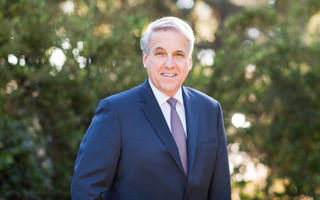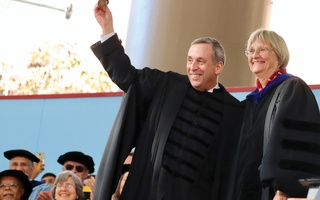{shortcode-7763e34dfbc3eb65de07e9eab5dae37123c1bbf9}
Though University President Lawrence S. Bacow was only officially installed as president of Harvard University weeks ago, he has already created long-term plans to ensure the success of the University. More specifically, Bacow, an economist by training, has challenged all Harvard schools to engage in “scenario planning” for the next recession. Though the U.S. economy is currently booming, Bacow has repeatedly warned that a recession is inevitable and that it is crucial to prepare for it. We commend Bacow for his foresight and wholeheartedly agree with his decision to plan ahead for a potential economic downturn in the future.
The focus on preparing for an economic downturn is especially necessary given Harvard’s history and the current political climate. During the Great Recession in 2008, Harvard quickly found itself in a precarious position, most notably indicated by an $11 billion single-year loss in the endowment. The recession also delayed the construction of the new Allston campus, froze faculty hiring in the Faculty of the Arts and Sciences, caused layoffs for hundreds of University employees, and delayed the kickoff of the capital campaign. These losses led to long-term setbacks that Harvard still has not recovered from. Harvard’s endowment growth is still lower than almost all of the rest of our peer institutions in the Ivy League. With the recent imposition of the federal endowment tax, Harvard’s precarious economic situation is even more clear. As such, a downturn as dramatic as what the University underwent in the last recession would simply be unacceptable.
When planning for the next recession, we encourage the Faculty of Arts and Sciences, as well as other divisions of the University, not only to be pragmatic in their plans, but also to prioritize that which makes Harvard excellent. Recessions often result in faculty hiring freezes, and though certain cuts may be unavoidable, Harvard’s schools should be as frugal as possible in order to ensure this doesn’t happen. Ideally, a recession should not limit the academic experiences of students.
Most importantly, a recession should not limit who has access to Harvard. Specifically, we strongly urge the University to maintain financial aid as a top priority regardless of what economic pressures may arise. Recessions and economic downturns often affect students’ ability to pay, and this may be especially true for low-income students. In this time, it is crucial for Harvard to maintain a strong financial aid program that can continue to support a diverse class.
It is also crucial for the University to strengthen these programs now, so that there is no danger of them being cut in the future. Students are the lifeblood of Harvard, a place whose mission it is to educate the best and the brightest. In order to do so, Harvard must remain a university that all students have equal access to, and must remain an institution that can attract all students, irrespective of their backgrounds.
Regardless of when the next recession is and how much of an economic downturn is coming, we are pleased to see University leaders are planning pragmatically for the future. We hope that in their plans, they continue to prioritize the academic experiences of all students. Harvard should always remain an institution where all students know that they can attend and receive the highest quality of education.
This staff editorial is the product of discussions at regular Editorial Board meetings. In order to ensure the impartiality of our journalism, Crimson editors who choose to opine and vote at these meetings are not involved in the reporting of articles on similar topics.
Read more in Opinion
Beyond the Bitter Railing

















